By Marc Jones
LONDON (Reuters) - Credit ratings in the developing world look set to grind lower again this year as the world economy slows, with Latin America likely to be the center of the action -- though the news might not be all bad.
The year is already off to a gloomy start, with S&P Global (NYSE:SPGI) warning last week that nearly a third of big bond issuers in emerging markets now have an unsustainable amount of debt.
Ratings matter for sovereign borrowers because the more highly rated they are, the lower their funding costs tend to be.
Fitch Ratings thinks there will be more downgrades than upgrades again this year and Moody's Investors Service still has close to twice as many countries on downgrade warnings, at 19, than the 11 it sees as candidates for an upgrade.
"Weaker emerging and frontier market countries face the greatest risks," Moody's said, while S&P flagged Argentina, Brazil, Egypt, Lebanon, and Pakistan in its list of those with unsustainable debt piles.
Much of it comes down to a mix of over-borrowing, trade tensions and a reliance by some countries on selling oil or other commodities whose prices have been volatile, but there are some notable idiosyncrasies now worth watching.
Fitch's top sovereign analyst, James McCormack, has analyzed what happens to countries' ratings when their currencies drop sharply, as many did in emerging markets last year.
He found that if the currency drops 30 percent for at least a year, the sovereign rating falls an average of two notches. More concerning, though, is that of 16 such cases seen over the last 18 years, six have ended in a default.
That could spell bad news for Turkey, which was downgraded once -- by Fitch -- last year, but even more so for B- rated Argentina, whose currency more than halved in value in 2018. It is already on that default list twice, in 2002 and 2014.
"I wouldn't be surprised if we saw more downward pressure (on global ratings) because we think the risks are really skewed to the downside," McCormack told Reuters.
GRAPHICS: When currencies plunge ratings fall - https://tmsnrt.rs/2Hk3QTJ
Two other South American countries will also be watched closely. First is Brazil which has lost investment-grade ratings from all three big ratings firms as its troubles have mounted in recent years.
Last year's election of far-right president Jair Bolsonaro and hopes he will drive through key economic changes have brought renewed optimism and propelled the real
A model calculated by one of S&P's divisions using data such as credit default swap prices, which can be a leading indicator for ratings moves, suggests good news for the rating too.
It shows financial markets currently pricing Brazil as if its credit rating was two notches higher than its actual BB-level. That would leave it just one further upgrade short of regaining investment-grade status.
GRAPHICS: Things looking up again for Brazil rating - https://tmsnrt.rs/2SY0FCj
CAIDO ANGEL?
Uruguay is another South American country that could be in the spotlight.
Fitch's McCormack flagged it as a potential "fallen angel" -- rating agency parlance for a country that drops from the investment-grade category into sub-investment-grade, or 'junk'.
Such a shift often forces larger pension and investment funds that focus on high-grade assets to sell the country's bonds, which in turn drives up its borrowing costs and causes more pain.
Fitch has Uruguay on the lowest rung of the investment-grade ladder, at BBB- with a negative outlook. S&P and Moody's still rate it higher, but studies from the likes of the European Central Bank have shown the first cut always causes the pain.
Asked if a downgrade for Uruguay was likely, McCormack said there was a good chance especially as the country had seen a big rise in debt since securing its investment-grade rating.
"We do have it on a negative outlook," he noted.
Moving in the opposite direction, meanwhile, could be Croatia. Both Fitch and S&P have it on watch for an upgrade, although as Moody's already assigns an investment-grade rating, most of the benefit may well have been seen.
Among the emerging markets heavyweights, China could come under pressure if it goes on a stimulus splurge to offset the effects of its trade war with the United States.
Ratings agencies have also warned that new U.S. sanctions could spoil Russia's positive rating story, although as it still has one of the world's lowest debt levels, a downgrade may not hurt too much.
GRAPHICS: Fitch sees more downgrades on the cards - https://tmsnrt.rs/2Hk1Jza
GRAPHICS: Moody's sovereign ratings - https://tmsnrt.rs/2T0ssSM
